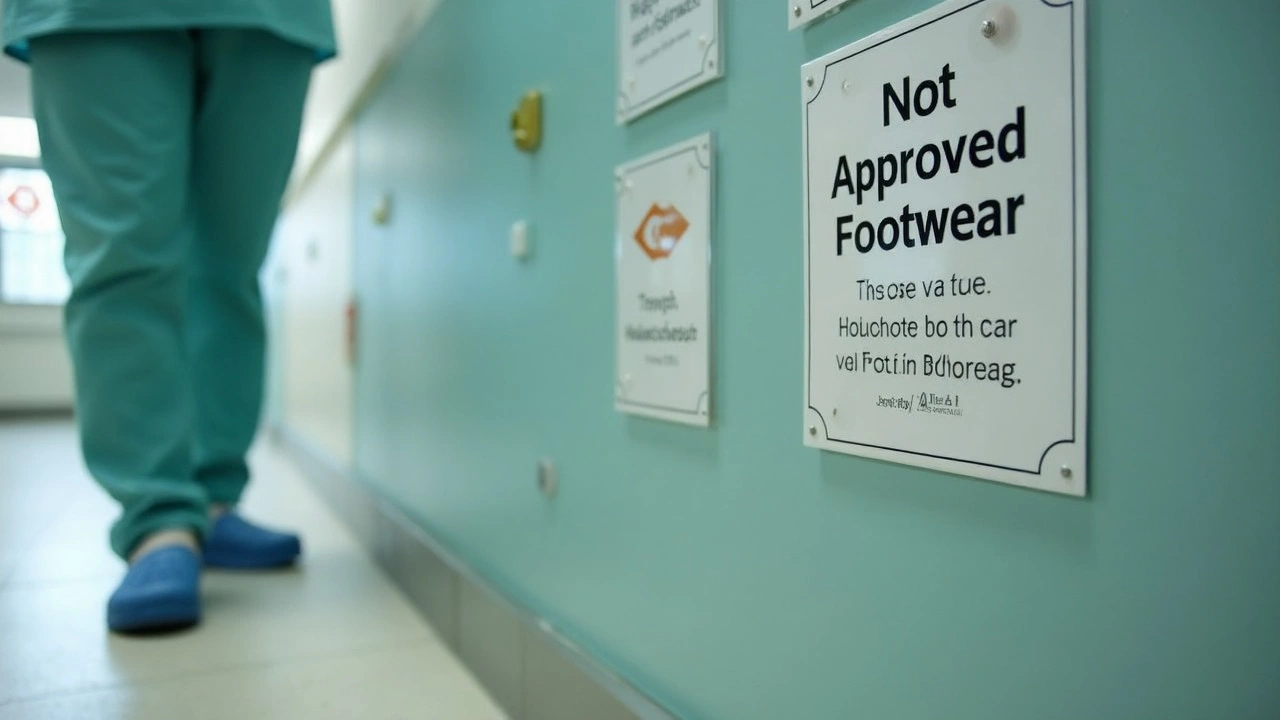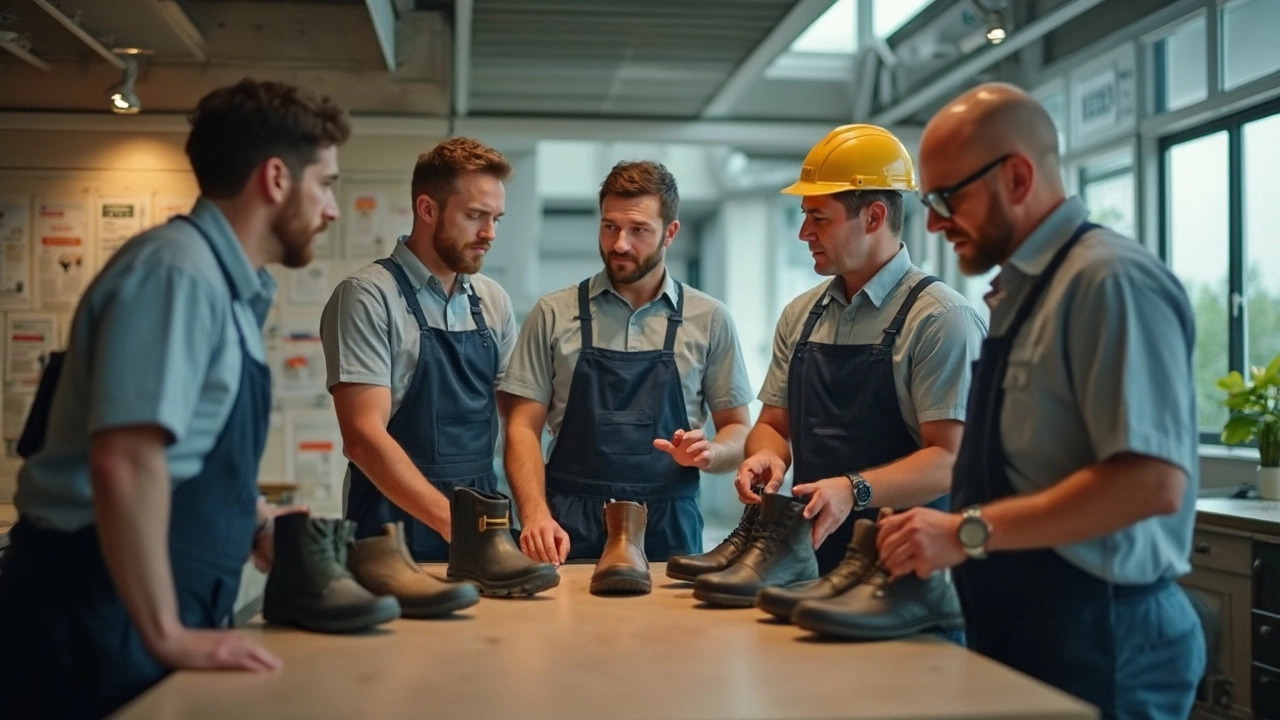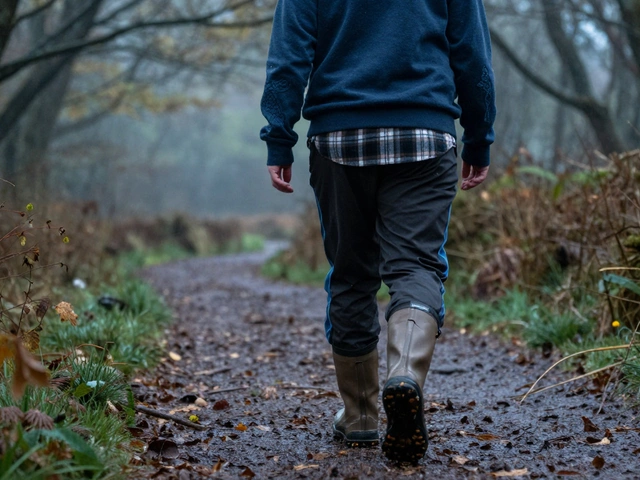In Ireland, work shoes aren’t just about looking smart—they’re a pretty big deal for legal reasons too. If you’ve ever wandered through an Irish café, busy hospital ward, or a wet building site in Limerick, you’ll spot a wild mix of footwear. But can you really wear Crocs at work here without landing yourself or your boss in trouble? This is the kind of question that keeps popping up in workplaces from Cork to Galway, especially as Crocs seem to pop up everywhere these days.
The short answer? It depends on where you work and what you do. Some Irish companies are totally fine with them, but health and safety laws do have a say—especially in jobs with slippery floors, heavy tools, or the risk of something sharp landing on your foot. The Health and Safety Authority (HSA) sets out clear rules, and it’s the Irish version of OSHA. Messing around with these isn’t worth the hassle—you could be pulled up for wearing the wrong shoes, or even lose your insurance cover if there’s an accident.
Before you stock up on Crocs in Dunnes or order your favourite colourful pair online, you’ll want to understand not just what’s trendy, but what’s actually allowed. That applies whether you’re an owner of a small family-run café in Kilkenny, an agency nurse in Dublin, or fitting insulation for a new build in Sligo. So, what’s the real story? And are Crocs safe—and legal—on the Irish job?
- Why Everyone’s Talking About Work Shoes in Ireland
- Irish Laws: Who Sets the Rules on Footwear?
- Are Crocs Really Banned at Work?
- Workplace Examples: Cafés, Hospitals, and Building Sites
- Best Alternatives to Crocs for Irish Workers
- Tips for Staying Safe (and Comfy) on the Job
Why Everyone’s Talking About Work Shoes in Ireland
People in Ireland are getting more vocal about work shoe rules for a bunch of reasons. Safety at work is a massive priority these days. If someone shows up to a job in Crocs or runners and gets hurt, it can mean big trouble—not just for them, but for the business too. Even in places like Dublin or Galway, you’ll hear stories about someone slipping in the kitchen or dropping a heavy tool on their toes. A lot of these mishaps come down to dodgy footwear.
Another big reason? Irish health and safety inspectors are tightening up on workplace footwear Ireland guidelines. According to the Health and Safety Authority (HSA), there were 8,279 reported non-fatal workplace injuries in Ireland in 2023, and trips or slips made up nearly a third. Shoes that don’t grip or cover your foot properly make things a lot worse.
It’s not just about keeping your toes safe, either. Insurance claims have gotten stricter across Ireland. If you get hurt at work and you’re wearing shoes that don’t meet your employer’s safety rules—like Crocs or sandals—your claim can be turned down. Insurance giants like Aviva and Irish Life have flagged up footwear in several recent workplace safety seminars.
Then there’s the cultural side. In small towns from Kerry to Louth, everyone knows someone working in a busy café or hospital, where non-slip shoes are nearly part of the uniform. But with Crocs or lookalike clogs now being everywhere (thanks in part to TikTok trends and hospital dramas), people are questioning “what’s actually okay?” more than ever.
Here’s a quick snapshot of why the right work shoes are making headlines in Ireland:
- Irish workplace safety inspections are on the rise, so bosses are stricter.
- Insurance policies often mention “suitable footwear” as a requirement.
- Workplaces with lots of spills (like bars and restaurants) demand shoes with solid grip and closed toes.
- A growing number of people want comfort—especially for jobs where you stand or walk all day—so Crocs get a look-in, but aren’t always safe enough.
Irish Laws: Who Sets the Rules on Footwear?
In Ireland, work shoe rules aren’t made up by your boss on a whim. The real authority here is the Health and Safety Authority (HSA). It's pretty much our version of OSHA in the US, and all workplaces—from tech offices in Dublin to SuperValu stockrooms—look to the HSA when it comes to safety regulations, especially footwear.
The HSA says employers have to do proper risk assessments. That means looking at all the dangers where you work—slippery floors, chemicals, heavy gear, or sharp stuff around your feet. Once that’s done, it’s the employer’s job to decide the footwear rules. So, you might get a memo banning flip-flops or trainers on the factory floor or a list of approved shoes for a kitchen or a hospital in Waterford. This isn't just fussy paperwork. If someone gets hurt and is wearing shoes that weren't suitable (yes, even Crocs), workplaces can get landed with fines or worse.
For especially risky jobs—think construction, healthcare, and hospitality—the HSA has set guidelines:
- Protective toecaps or safety boots are needed in construction and warehouse jobs.
- Non-slip soles are a must for kitchens, bars, hospitals, and cleaning gigs.
- Open-backed or open-toed shoes (which includes most Crocs designs) are generally not allowed where spillages, sharps, or heavy objects are a risk.
Here’s a quick view of what kind of footwear is commonly allowed in certain Irish workplaces:
| Workplace Type | Footwear Permitted | Common Risks |
|---|---|---|
| Café or Restaurant | Non-slip shoes, closed toes/heels | Slips, spills |
| Construction | Steel-toed boots | Falling tools, sharp debris |
| Healthcare | Waterproof, non-slip, closed-back | Spills, sharps, contamination |
Here’s the bottom line: even if Crocs are comfy and you see them in hospital corridors or behind some bars, don’t assume they’re always allowed. If you’re ever unsure, check your HSA workplace risk assessment or ask your employer. The OSHA Ireland approach is clear—safety first, fashion (sadly) second.
Are Crocs Really Banned at Work?
So, here’s the burning question: are Crocs actually banned from workplaces in Ireland? There isn’t a law that says, ‘No Crocs allowed anywhere.’ But that doesn’t mean you can pop on a pair and stroll into any job. It all comes down to where you work and what risks are there.
The Health and Safety Authority (HSA) in Ireland doesn’t call out Crocs by name. Instead, they say you need ‘suitable’ or ‘safety’ footwear if your work puts your feet at risk—think slips, falling things, electrical hazards, sharp objects. Plenty of jobs, like in construction or kitchens, have these risks every day. Cases have popped up where hospital trusts in Dublin banned Crocs after reports of injuries from dropped needles and sharp tools. Slippery floors in restaurant kitchens and fresh food counters at places like SuperValu or Centra also get picked out in health and safety inspections. Most employers use these rules to create their own policies for the workplace.
When a company does a risk assessment—a regular thing for Irish employers—they’ll decide which shoes are safe. That’s where Crocs usually get the boot, especially if they’re the classic, open-heeled style. These don’t give the grip or toe protection you need in risky spots. Some newer Crocs have better slip-resistance and closed toes, but even these aren’t good enough for heavy-duty jobs.
Let’s get specific about some settings:
- Hospitals and clinics: Many HSE facilities, especially in big cities like Dublin and Cork, have policies against open-back Crocs because of needle-stick injuries.
- Construction sites: Under Irish health and safety rules, only proper steel-toe boots, EN ISO 20345 standard, are allowed. Crocs just don’t make the cut.
- Food prep and kitchens: Some chains and small cafés in Galway and Limerick list ‘fully enclosed, slip-resistant shoes only’ in their contracts—so Crocs with holes or open backs are out.
One study from an Irish hospital, published in 2022, found that 36% of nursing staff reported foot injuries after switching to soft-soled shoes. This pushed safety managers to clearly ban Crocs in all patient areas.
Bottom line: check your company’s own policy before showing up in Crocs. In lots of Irish workplaces—especially those with health, construction, or food handling—they’re off limits. In lower-risk roles, like retail or desk jobs, it’s usually up to your boss, but you still need to be sure they meet the ‘suitable footwear’ bar in OSHA Ireland guidelines.

Workplace Examples: Cafés, Hospitals, and Building Sites
Walk into a café in Ireland—let’s say in Galway’s Latin Quarter or on South Anne Street in Dublin—and you’ll spot staff in everything from trainers to slip-on clogs. But here’s the thing: while Crocs might seem grand for comfort, they aren’t always a safe bet. The Irish workplace safety rules don’t single out Crocs by name, but they do insist on footwear that won't slide around or soak up spills. So, most owners now steer clear of shoes with holes, flimsy straps, or that can't grip well in an oily kitchen. Insurance inspectors actually check for this; break the rules and your claim for a slip could go straight in the bin.
Now, over in hospitals—from Cork University Hospital to the Mater in Dublin—things are a bit more strict. Nurses, porters, and kitchen staff face wet floors and dropped dressings on the daily. The HSA and hospital infection control teams say it’s got to be non-slip, closed-toe shoes, nothing that lets fluids through, and definitely no open heels. Crocs with extra vents or the open-back style? Usually a no-go. HSE guidelines across Ireland back this up. Some places do allow Crocs-brand work shoes, but only the heavy-duty, closed versions that meet safety standards. If you’re agency staff, expect your footwear checked at induction.
Then there’s building sites—think Dublin Docklands or a small job in rural Mayo. Here, it's not just about dirt; it’s about keeping all your toes attached. Work shoe rules mean steel-capped boots are the norm, plus slip-resistant soles. Crocs aren’t allowed, no debate, no matter how hot it gets in the summer. Site managers are strict; wearing anything that can't take a blow from a hammer or a rusty nail could get you sent off-site. It’s actually in the site safety induction forms.
| Workplace | Allowed Footwear | Crocs Permitted? |
|---|---|---|
| Café/Restaurant | Non-slip, closed-toe, easy to clean | Rarely (unless heavy-duty, closed) |
| Hospital/Healthcare | Closed-toe, non-slip, fluid resistant | Only closed, non-vented, certified models |
| Building Site | Steel toe, slip-resistant, safety rated | Never |
So if you’re aiming for comfort at work, your best bet is to find shoes that tick both the style and the HSA boxes. It’s not worth risking an accident, a stern word from the boss, or—worst of all—a denied insurance claim. Before you rock up in your favourite Crocs, double-check your workplace policy. Even some office roles in Irish companies now mention footwear in their health and safety briefings.
Best Alternatives to Crocs for Irish Workers
If Crocs at work are iffy or totally off-limits in your place, don’t stress—there are loads of shoe options that fit Irish safety rules and actually feel decent on your feet. Whether you’re on your feet all day at SuperValu, running around a nursing home in Bray, or hauling gear on a building site in Waterford, picking the right shoes can really save your back and toes.
First up, check if your job needs slip-resistant soles. For folks working in kitchens, hospitals, and warehouses, slip-proof shoes are a must under Irish workplace safety laws. Brands like Skechers Work, Oxypas, and Shoes for Crews have styles ready-made for café workers, nurses, and cleaners. You can usually order them straight from Irish suppliers like shoesforcrews.ie or pop into a workwear shop in places like Dublin’s Capel Street.
If toe protection is needed (think construction or even electrical work), proper steel-toe boots are the standard. Irish builders swear by familiar names like Caterpillar, Dunlop, or Apache. Many hardware shops in Ireland, such as Woodie’s or local vendors in Cork and Galway, stock these as basics. Some boots even come with waterproofing, which comes in handy in the usual Irish rain.
For healthcare or hospitality staff in search of comfort, clogs made by Birkenstock or Oxypas often tick the box. They’re closed-toe, easy to clean, and usually meet health and safety criteria—plus, they can handle those 12-hour shifts. Loads of Irish nurses choose these for a reason, and the Irish Nurses and Midwives Organisation mentions them in some of their safety guides.
Here’s a breakdown of some popular alternatives and what jobs they match:
| Shoe Type | Best For | Popular Brands |
|---|---|---|
| Slip-resistant trainers | Cafés, shops, cleaning | Skechers Work, Shoes for Crews |
| Clogs (closed-toe) | Hospitals, kitchens | Oxypas, Birkenstock |
| Steel-toe boots | Construction, warehouses | Caterpillar, Apache, Dunlop |
When hunting for the right work shoe rules match, check your company’s policy first—lots of jobs put out a list of pre-approved brands, especially in bigger cities like Dublin or Limerick. Where possible, try them on in local shops to make sure you get the right fit, especially since Irish sizing can sometimes be a bit off compared to UK or US sizes.
Don’t forget—if you have foot problems or need extra support, Irish podiatrists often recommend getting a work shoe with removable insoles for custom orthotics, and some HSE clinics even give tips on where to get fitted locally. Stick with quality, don’t just go for the cheapest deal, and you’ll be miles ahead—as far as the Irish workplace safety crowd is concerned.
Tips for Staying Safe (and Comfy) on the Job
Staying safe and comfy in your work shoes isn’t just about avoiding blisters or sore feet. In Ireland, dodgy footwear can lead to real trouble if you’re not keeping up with the Irish workplace safety rules. You want something that protects your toes and keeps you standing all day—without breaking the bank or your back.
Here’s the lowdown for picking shoes that keep both the OSHA Ireland inspectors and your feet happy:
- Check your company’s rules first: Don’t chance it—ask your boss or check the staff handbook before wearing Crocs or any other shoes. Irish companies take health and safety seriously, and requirements can differ by site or role.
- Look for certified safety features: If you’re working anywhere with risk (think kitchens, hospitals, construction), you’ll want shoes marked with EN ISO 20345 or the CE mark for protective footwear. This stamp means they’ve been through proper testing for the Irish market.
- Focus on grip: In wet and wild Irish weather, non-slip soles are essential. Kitchens around Dublin and Galway often get surprise visits from the HSA, who look out for slip hazards. Make sure your shoes are slip resistant.
- Closed toes and secure fit: Open-toe or backless shoes like classic Crocs usually don’t make the cut, especially in healthcare or on building sites. A snug fit prevents trips and keeps you out of the A&E.
- Replace worn shoes: Worn-out treads are no good in slick conditions. Most Irish nurses and chefs swap their shoes out yearly, especially after the rainy winter. If the soles are flat or coming apart, it’s time for a new pair.
- Break shoes in—don’t risk a new pair on a long shift: No one enjoys their first 10-hour shift in rock-hard shoes. Wear them around the house before bringing them to work in Cork or Waterford.
Just how risky is bad footwear? According to the HSA, slips, trips, and falls make up almost 30% of all workplace injuries reported in Ireland each year. Have a look at this quick table showing the most common injury causes in Irish workplaces, based on recent figures:
| Cause | Percentage of Reported Injuries (2024) |
|---|---|
| Slips, Trips & Falls | 29% |
| Manual Handling Injuries | 28% |
| Falls from Height | 15% |
| Other (Machinery, etc.) | 28% |
Those slip stats alone show why it’s worth putting in the effort to get the right shoes. Don’t just follow the crowd—think about your own job, ask mates what they wear, and make the best choice for lasting comfort and safety on the job.





